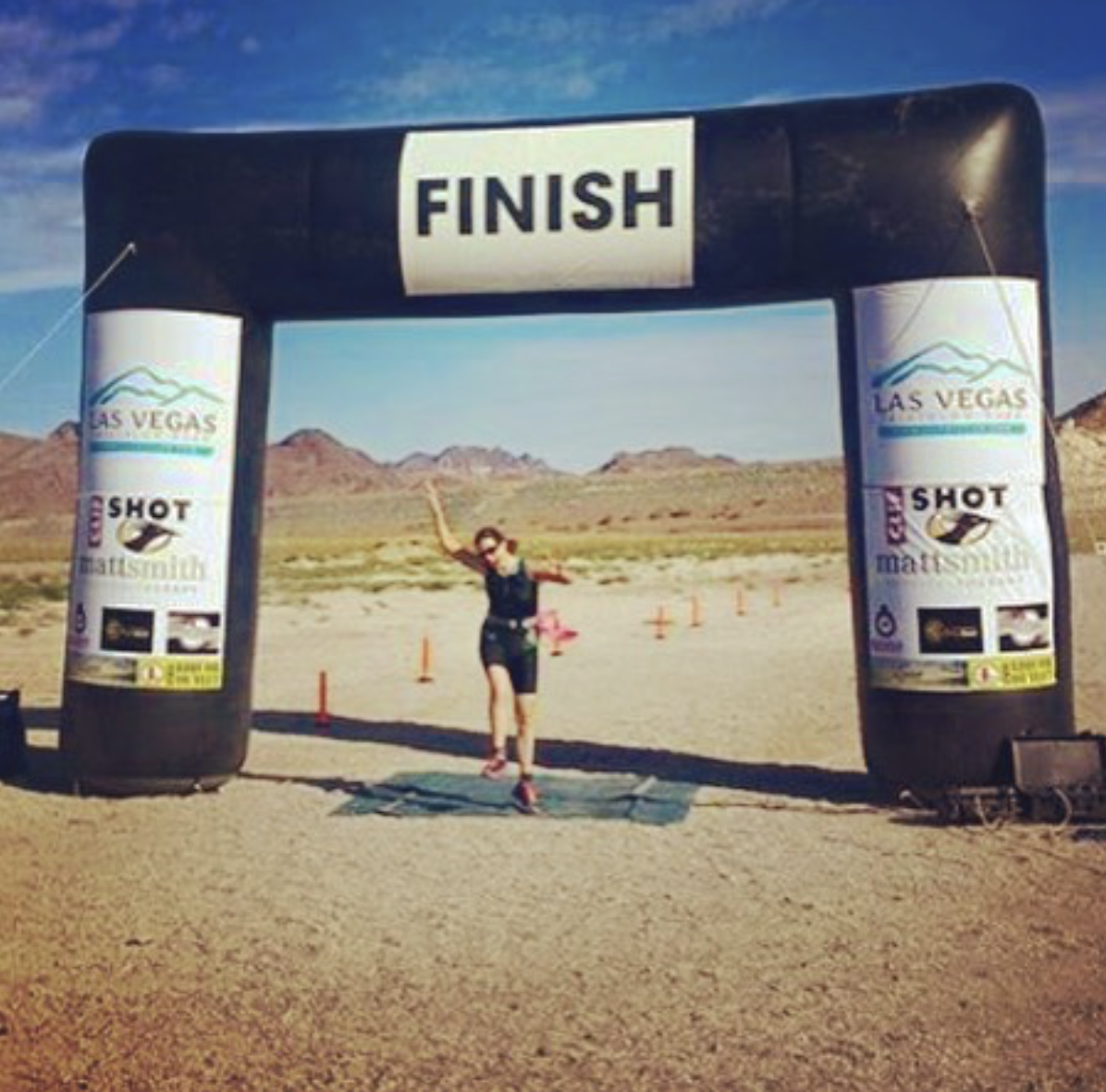
Lessons Learned on my Triathlon Journey

On an early spring morning at Lake Las Vegas, I treaded water with about fifty other women. The nervous silence of the crowd broke when a woman off to my side said, “Ladies, if we can survive childbirth, we can survive this!”
Laughter sounded all around me and then the burst of gunfire signaled the start of the race. The limbs of the women churned the already murky water. I panicked and flailed my arms and legs in what should have been a swim. Within minutes a reverberating thought overwhelmed me: “I hate this.”
The crowd swam ahead of me as I choked and struggled to breathe. A race volunteer in a kayak pulled up alongside me and asked if I wanted him to take me to shore.
I shook my head. He asked every several minutes. The answer was always no.
My heart sank when I realized I was the last one out of the water–by a long shot. Hours later, I stumbled toward the finish line, unable to find it because the race director had already taken it down.
It was my first sprint distance triathlon (a 500 meter swim followed by a 12 mile bike ride and a 3.1 mile run) and I finished with the distinction known in the triathlon community as DFL (Dead F—ing Last). It would be years before I attempted another race.
However, I’m glad I persevered and returned to racing. Not only did I prove to myself I could overcome the embarrassment of my first sad triathlon experience, I also learned important life lessons along the way.
Here are the lessons I learned that you can apply to your life, even if you never swim, bike, and run in a triathlon:
1. Let yourself be a beginner
Prior to my first triathlon, I had never swum in open water before. When I re-committed to triathlon training, I knew I’d have to overcome my fear of swimming in open water, so I signed up for several open water swim workshops. I hated them until my fifth swim when, as if a switch flipped, I became more comfortable despite the lower visibility, choppy waves, and different sighting patterns of the open water. Later, to my surprise, I grew to love my swims at the lake.
I’ve since learned that a lot of things in life can be that way. Having the patience and self-compassion to allow yourself to be a beginner can open the door for new experiences you might not have if you give up. You’ll make mistakes at first, but these are the best ways to learn how to improve the experience next time. Don’t beat yourself up for these mistakes. It’s your first time! Forgive yourself and keep going.
If something is important to you, it’s worth more than one try. You might surprise yourself about what you can grow to enjoy.
2. Find your team
Another mistake I made when training for my first race is that I did all my training and preparation alone. The second time around, I joined a local triathlon team. I met people of all ages and different levels of tri experience. Everyone was welcoming and encouraging.
Not only did I now have a scheduled plan and people to get ideas and inspiration from, but I also had a built-in support network that made the long hours of training a lot more fun. I met one of my best friends through the tri team and we’re still supporting each other, only now in non-race-related goals.
Having a support network of people with similar goals can give you the motivation to keep going. Your team members—whether they’re study partners, classmates, or friends—have perspectives and ideas that can help you. Whenever possible, don’t go it alone.
3. Anticipate your obstacles
So much can go wrong when you’re swimming, biking, and running. The last time you want something to go awry is on race day. In triathlon, one motto is “Nothing new on race day.” The more comfortable and practiced you are with the movements, equipment, and conditions, the more confident you’ll feel when the starting gun goes off.
No matter what you’re doing, practice is essential. However, practice is no guarantee. A little defensive pessimism can go a long way to help you anticipate what might go wrong. For example, I learned to wear an extra swim cap to prevent my goggles from being kicked off my face during the swim portion of the race. I also learned basic bike maintenance, so I would know what to do if one of my tires went flat.
Whatever your goal, it’s helpful to believe that you can reach it, while at the same time considering what difficulties might arise. What might derail you from your goal? How can you prepare for that possibility, so it doesn’t prevent you from crossing your “finish line”? I discovered that an effective way to anticipate and prepare for potential obstacles is to talk to other people who are more experienced in what you want to do. My triathlon teammates gave me great advice.
4. Sometimes you need to persevere despite pain
Most triathletes will tell you that pain is inevitable. At some point, whether on the bike when your legs are screaming as you pedal up a steep hill, or on the run when your feet are blistered and sore, you may feel discomfort or pain.
In the thick of the race, however, putting the pain in perspective allowed me to keep going. The aches my body felt were temporary. At times when I wanted to quit, I reminded myself of all my hard work, training, and the finish line that awaited me. I pushed through the pain.
When you’re working toward a big or difficult goal, anticipate moments when you’ll feel uncomfortable. This is not the time to give up! Keep going. The satisfaction of achieving your goal can be one of the best feelings. You’ll prove to yourself that you can do it and then you’ll know you can.
Even though I’m not participating in triathlons anymore, I still apply the lessons I learned during my tri days to the academic goals I set for myself now. I allow myself to be a beginner by approaching each class with curiosity and not getting discouraged if I don’t immediately “get” or enjoy what I’m learning. I persevere even through painful tasks and projects. I find my team by studying with friends, and I anticipate obstacles by focusing on the material I think will most likely trip me up on the test. I hope you find these lessons helpful and can use them to reach your goals, too.
 Lindsay Denecker is studying psychology at UNLV in pursuit of her goal to be a lifelong learner. She joined the Interactive Measurement Group in Spring 2019 and is thrilled to be utilizing statistics to conduct research. In lab, she has acted as Lab Website Coordinator and Newsletter Webpage Creator. With the knowledge that she has gained from her studies and in lab, she hopes to apply psychology to the workplace in the future.
Lindsay Denecker is studying psychology at UNLV in pursuit of her goal to be a lifelong learner. She joined the Interactive Measurement Group in Spring 2019 and is thrilled to be utilizing statistics to conduct research. In lab, she has acted as Lab Website Coordinator and Newsletter Webpage Creator. With the knowledge that she has gained from her studies and in lab, she hopes to apply psychology to the workplace in the future.